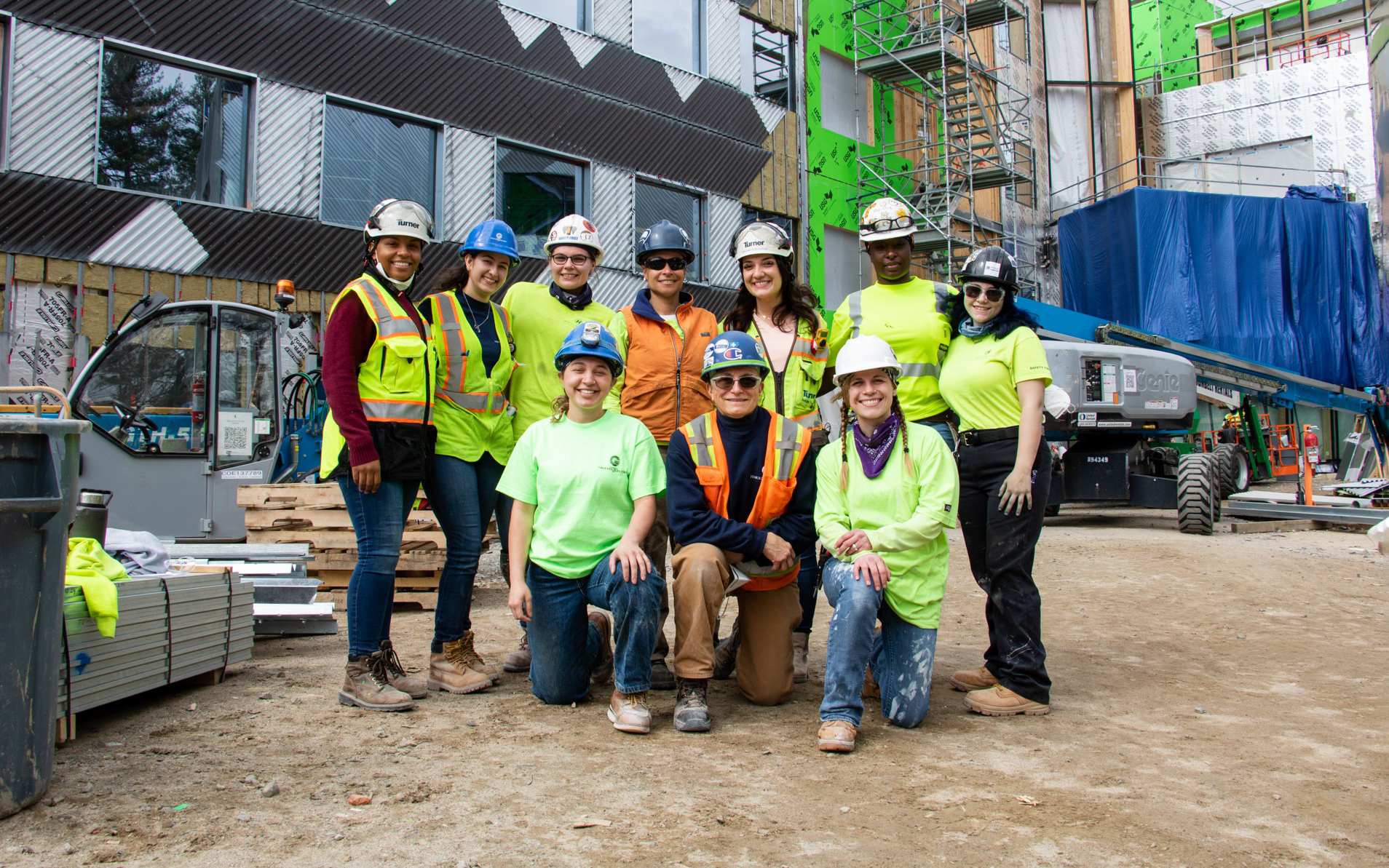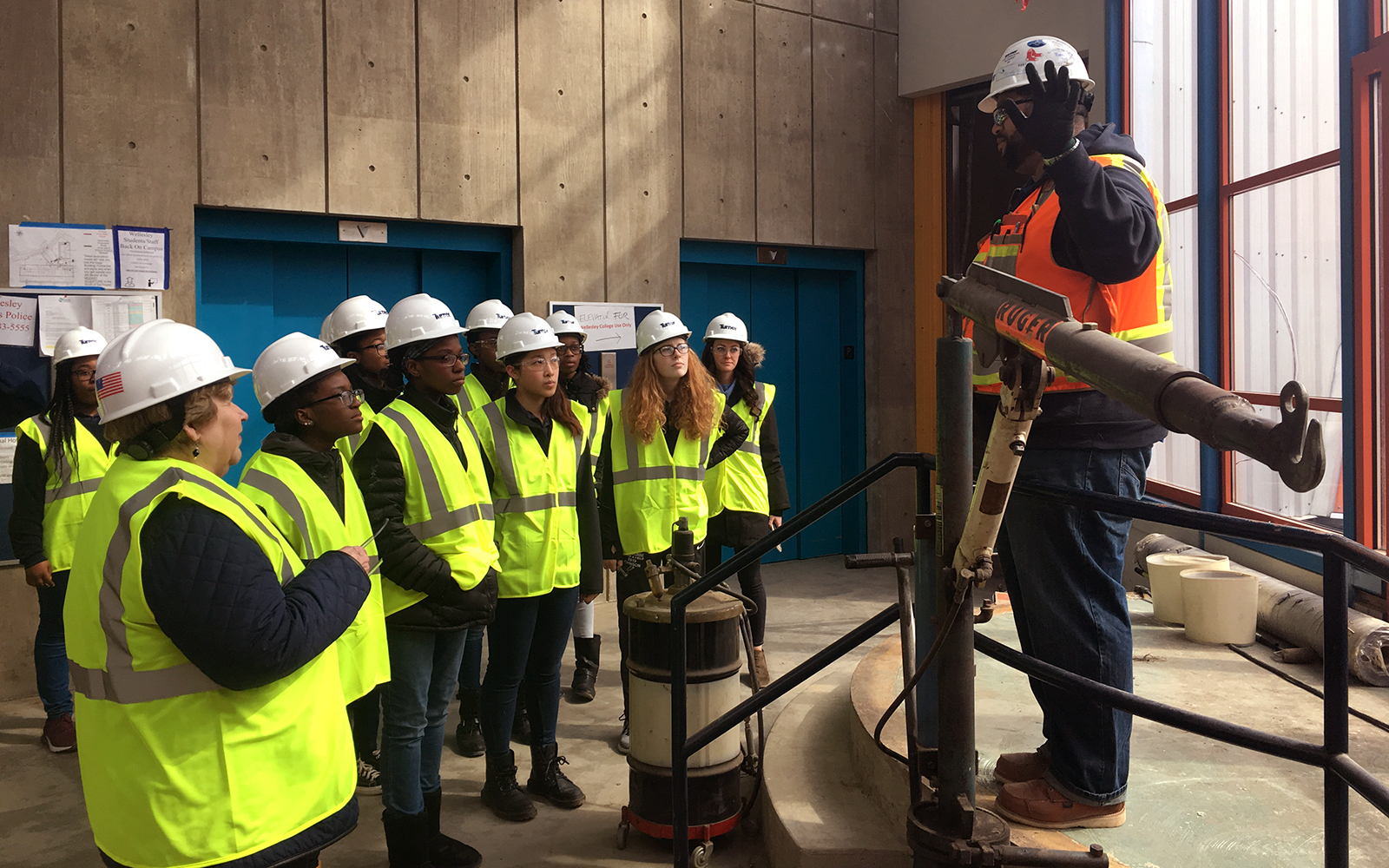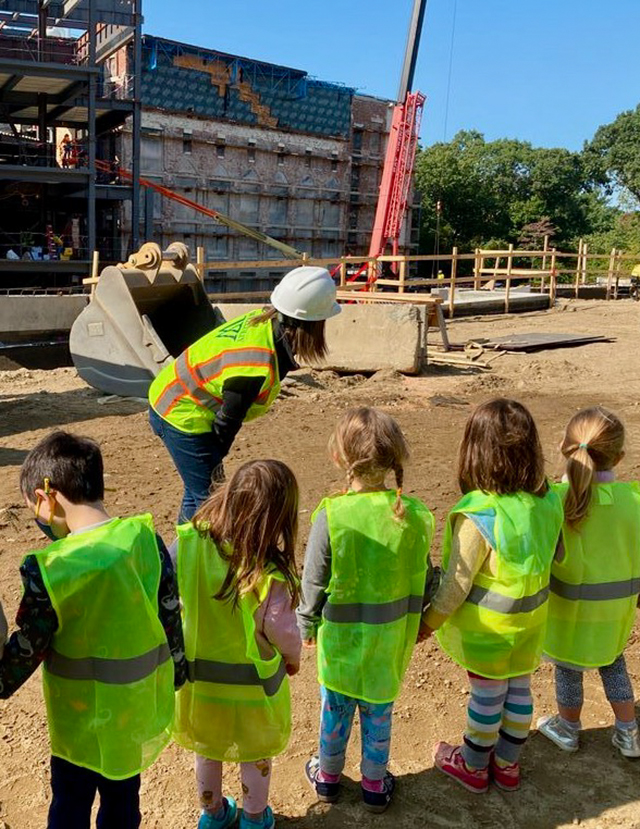|
Getting your Trinity Audio player ready...
|
Given his early experience in the field, it’s a miracle that Tim Singleton stayed around. But the construction space is better because he did.
He was working as a tradesman at the beginning of his career when one of his coworkers told him the only reason that he had a job was because he was Black. “And I told him, the only reason that he was on this project was because his uncle was the superintendent,” Singleton remembers. “That’s the issue I’ve always looked to address. You have to know somebody to get these jobs, and it’s about improving access to make the building space a more equitable one.”
As associate director of construction at Wellesley College, Singleton lives his mission on behalf of an organization that is determined to educate women to make a difference in the world. And from his position, Singleton creates those opportunities within his own organization to break down traditional barriers in the construction space.

In his own words, Singleton shares with American Builders Quarterly about building a more equitable pipeline for the future and what it means to actually practice what you preach when talking about equity in construction.
Since 2018, our capital projects team has been working with diverse groups of other owners, contractors, and designers to move the needle on building higher-performing teams through continuous improvement. We know through research that diverse teams are a part of this, and our efforts have led us to focus less on percentages and quotas.
Our discussions have been about helping to lead in the way we create real, long-term minority- and women-owned business enterprise (MWBE) improvements in the design and construction industries. We do it because not only is it the right thing to do but it leads to better outcomes for everyone involved.
We know that it’s about building the pipeline for the future. We want to lead by example. We want others to follow us. Do what we do.

In 2018, we began construction of our new $200 million-plus science complex. It included major new and deferred maintenance work, a teaching and research greenhouse, another greenhouse to house our botanical collections, a new observatory, and landscaping.
In 2019, the Wellesley College senior leadership recommended that our project team to follow MWBE quotas per Massachusetts state guidelines for public construction projects. These efforts and policies have been in place for many years in many places throughout the country.
We were very successful in meeting the state’s guidelines on our private college campus. However, our community of owners, contractors, and designers recognized and agreed that efforts must be redirected to allow for much better long-term outcomes. Together as a community, we are more powerful and can build more momentum than the individual efforts on our campuses.
We are coming together to raise the bar on expectations for each other and our supply chain partners by moving beyond quotas to substantive opportunity creation for underrepresented individuals and firms. By educating, learning from, and challenging each other and our communities, we’re breaking down the barriers to systemic change. We created goals, both short- and long-term.
Short-Term Goals
- Build culture of diversity inside our organizations
- Support underrepresented firms to engage in work with us
- Alter and share procurement practices to partner with like-minded vendors
Long-Term Goals
- Build the pipeline
- Develop best practices and share them with others
- Measure, track, and report outcomes
On the campus of Wellesley College, we have altered our procurement practices to identify and seek planners, designers, and builders who actively work for real, long-term diversity changes within their industries. We will no longer use only quotas and percentage counts to drive change.
We say, “If you want to work on our campus as a designer or contractor on our larger projects, we expect you to do much more than just count percentages. You must be doing things that we know really create real, long-term diversity, equity, and inclusion improvements within the architectural and construction industries.”
Here are nine examples of what we see now from those working on our campus:
Turner Construction Company
Turner Construction Company (TCCO) led by example on our science building project, and we’re talking about almost all the trades, superintendents, project managers, and field supervisors, and even TCCO’s vice president. It frequently toured diverse youth groups on site so that these kids could “see people that look like them, doing things that are not typically done by people that look like them.” TCCO leverages its relationships with local community groups to reach diverse populations that may not be reached through traditional outreach for workforce development and youth STEM engagement.
Elaine Construction Company
As a third-generation, family-owned and operated WBE, Elaine Construction’s dedication to a diverse workforce is a challenge that it embraces. Acknowledging that challenges extend beyond visibility and access to include payment terms, bonding, capacity, favorable loans for business expansion, and more, begins to unpack the breadth and depth of the challenge. As Elaine Construction expands its understanding, form alliances and partnerships within the industry, and with clients, we witness change. From (former) Mayor Walsh’s Pay Equity Compact to its affiliation with the Commonwealth Institute, and participation in MA Workforce Training Fund programs—both in the office or field—Elaine Construction values the individual so that the team can succeed.
Suffolk Construction Company
In 2010, Suffolk launched an accelerator program, Build With Us @ Suffolk, to offer small business enterprises and minority-, women-, and veteran-owned business enterprises (MWVBE) the experience to work with Suffolk or other firms. The eight-course interactive program is structured with a focus on construction management procedures and processes. Upon graduation, each trade partner is paired with a Suffolk executive who serves as a mentor and provides continued support for lasting development and opportunities.
Suffolk included LJV Development as part of the team to whom the college awarded a $10 million project. Suffolk formed a mentoring partnership with LJV following its successful completion of the Build With Us at Suffolk program and its successful completion of a smaller project on campus. As a an MWVBE, LJV has already become a valuable team member.
Dellbrook | JKS Construction Company
Dellbrook | JKS’ Community Partner Accelerator Series consists of two half-day sessions hosted on a quarterly basis with the intention to assist its MWBE trade partners through a series of trainings that will make them better prepared to work with Dellbrook | JKS and other CMs. The curriculum was designed specifically to assist with barriers such as insurance, bidding, estimating, safety, accounting, and more.
Upon completion of the Partner Accelerator program, each subcontractor is equipped with Procore and a Certificate of Completion that signifies they have completed the course and are better prepared for success on all of their projects. Dellbrook | JKS has also presented trade partners with iPads at the end of the program to give them the physical tools they need in addition to the education.
Walsh Brothers
Walsh Brothers is committed to treating all employees with respect and dignity, and the diversity of its employees enhances creativity and brings unique viewpoints to the company. The Women of Walsh (WOW) strives to unite women company-wide and improve the workplace by creating opportunities and supporting their personal and professional life.
WOW’s events and programming are geared toward increasing awareness of issues that specifically affect women in the industry. It works to support and facilitate learning through career development and leadership skills events. Additionally, WOW holds social events to help connect women with other women, share ideas, and encourage informal mentorships and networking opportunities.
Shawmut Construction Company
Shawmut has actively partnered with the Compliance Mentor Group on Harvard projects to run its signature workforce program. This is a three-phase, twelve-month mentorship program for Boston-area career and STEM school students. Through group learning, job-shadowing, and mentoring experiences, students become acclimated to a project site and work with the project team members whose careers align with the students’ academic studies and career goals.
Lee Kennedy
Lee Kennedy (LK) is a full supporter of Operation Exit, which trains young people returning from incarceration by giving them a second chance. Many of these are women and people of color. LK is a supporter of Building Pathways, a six-week pre-apprenticeship program that provides low-income women and minorities an introduction into the highly competitive apprentice opportunities, and Youth Build Boston, which provides underserved young people with the support and credentials needed to successfully enter the building trades. Christine Walsh, its director of government and community relations is a cochair for the Building Pathways Employers Advisory Committee.
Isgenuity
Many Isgenuity employees are members of local and national professional organizations that focus on elevating the next generation of women and minorities in the design profession. They are active supporters and participants in the Professional Women in Construction’s Boston chapter, the National Organization of Minority Architects and its Boston chapter, and the Young Designers Professional Development Institute, among others.
Isgenuity continuously improves its approach to addressing diversity, equity, and inclusion in the work and organization through these memberships. This may be why it is so successful in having a diverse team. The design firm has connected with many others in the industry who support the mission to advance women in their design and construction careers. We (at Wellesley) have been active participants on outreach and scholarship giving boards, and we have presented in public forums on career advancement for women.
Finegold Alexander Architects
Finegold Alexander Architects (FAA) has become a women-owned business by promoting from within and leading by example. FAA works to promote a culture in which its staff are empowered to support their families, pursue individual and community interests, and thrive economically. The firm has a formal mentoring program, schedule flexibility (implemented pre-COVID), offers paid time off for volunteering, and offered paid parental leave prior to the 2021 implementation of the Massachusetts Paid Family and Medical Leave program. The firm additionally is a sponsor of NOMA (National Organization of Minority Architects) Project Pipeline, which provides summer experiences and introduction to the design professions for students of color, as well as employing Boston high school students for summer internships through the Boston Private Industry Council program.
designLAB Architects
DesignLAB architects is another women-owned business created from promoting from within. It is focused on improving communities through mentoring and supporting emerging designers. As such, designLAB has committed to an ongoing internship program dedicated to supporting Black, Indigenous, and people of color as they enter the profession.
The three-month program employs aspiring architects with the goal of giving them a broad range of experience and exposure to the profession. The program is fully compensated and open to any students who are currently enrolled in a professional degree program in architecture and identify as Black, Indigenous, or a person of color.

We are pushing to have the conversation with anyone that will listen. Focus less on just counting percentages. Do more to build the pipeline. Yes, it’s the right thing to do. But we also know through numerous studies that more diverse teams lead to continuous improvement and higher-performing teams.
Higher-performing teams lead to better outcomes for owners. And more successful projects lead to more work for designers and contractors.
Suffolk is a national enterprise that builds, invests, and innovates. We are an end-to-end business that provides value throughout the entire project lifecycle by leveraging our core construction management services with vertical service lines that include real estate capital investment, design, self-perform construction services, technology start-up investment, and innovation research/development. At Suffolk, we service clients in every major industry sector, including healthcare, mission critical, science and technology, education, gaming, transportation/aviation, and commercial. Learn more at suffolk.com.


